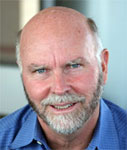![]()
SCIENCE
June 29, 2007
NEWS OF THE WEEK
Replacement Genome Gives Microbe New Identity
Elizabeth Pennisi
In a feat reported in a paper published online by Science this week (www.sciencemag.org/cgi/content/abstract/1144622), researchers have induced a bacterium to take up the entire genome of another, related bacterium, thereby transforming one bacterial species into another.
![]()
THE NEW YORK TIMES
June 29, 2007
PAGE ONE
Scientists Transplant Genome of Bacteria
By NICHOLAS WADE
Scientists at the institute directed by J. Craig Venter, a pioneer in sequencing the human genome, are reporting that they have successfully transplanted the genome of one species of bacteria into another, an achievement they see as a major step toward creating synthetic forms of life.
Other scientists who did not participate in the research praised the achievement, published yesterday on the Web site of the journal Science. But some expressed skepticism that it was as significant as Dr. Venter said.
His goal is to make cells that might take carbon dioxide out of the atmosphere and produce methane, used as a feedstock for other fuels. Such an achievement might reduce dependency on fossil fuels and strike a blow at global warming.
"We look forward to having the first fuels from synthetic biology certainly within the decade and possibly in half that time," he said.
Richard Ebright, a molecular biologist at Rutgers University, said the transplantation technique, which leads to the transferred genome’s taking over the host cell, was"“a landmark accomplishment." ...

THE TELEGRAPH
June 29, 2007
From reading DNA to writing it
By Roger Highfield, Science Editor
First artificial life could be created 'within months'
Man could be on the brink of creating the first artificial organism, a landmark development that would provide a profound insight into the origins, workings and essence of life, and vast new opportunities to exploit living organisms.
The scientist behind the effort, Dr Craig Venter, wants to synthesise new kinds of bug to clean up the environment, generate biofuels and green energy, even mop up greenhouse gases.
But this pioneering research has inevitably triggered unease about the limits of science, fears about “playing god,” and raises the spectre that this technology could one day be abused. ...
![]()
THE WASHINGTON POST
June 29, 2007
Scientists Report DNA Transplant
Organisms Adopt Donor Traits
By Rick Weiss
Scientists said yesterday they had transplanted a microbe's entire, tangled mass of DNA into a closely related organism, a delicate operation that cleanly transformed the recipient from one species into the other.
After the operations, the "patients" -- single-celled organisms resembling bacteria -- dutifully obeyed their new genomes and by every measure exhibited the biological personas of the donors.
"This is equivalent to changing a Macintosh computer into a PC by inserting a new piece of [PC] software," said study leader J. Craig Venter, chief executive of Synthetic Genomics, a Rockville company racing to be the first to create fully synthetic, replicating cells. ...



